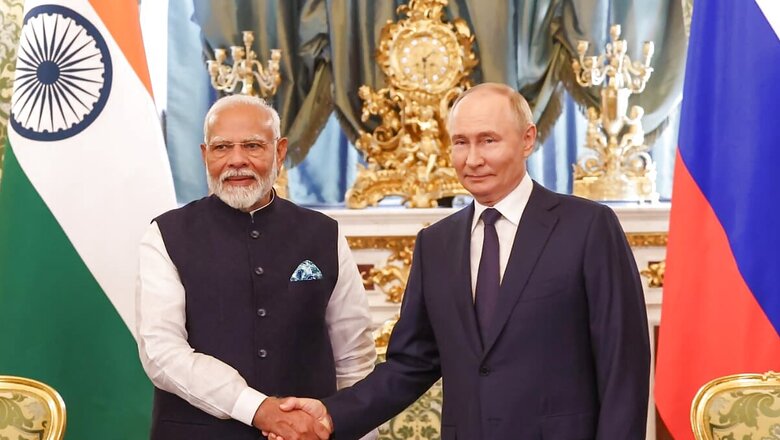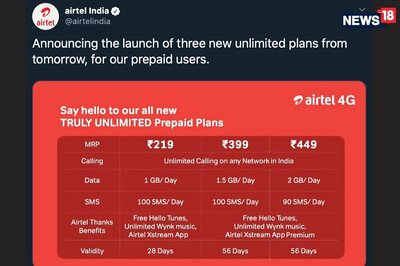
views
All eyes were on the visit of Prime Minister Modi to Russia, particularly Western eyes, as members of the North Atlantic Treaty Organisation (NATO) met almost simultaneously in Washington. The agenda of that meeting was to discuss strategy related to Russia, including how to further pressure Moscow through logistical assistance to its adversaries, streamlined by the security alliance. Though Modi’s visit was scheduled long before, Delhi’s ties with Moscow will inevitably come under intense scrutiny. The key question then is where these ties stand.
It’s complicated
As they say, it’s complicated. In Moscow, PM Modi stressed the need for peace, even as Russia showered him with honours and meticulous protocol. Despite this, Modi chose to refer to the attack on the children’s hospital in Ukraine, stating that wars offer no solutions. Clearly, a mediation line is being pursued here, and the US is well aware of it. The State Department spokesperson stressed that “any resolution to the conflict in Ukraine needs to be one that respects the UN Charter, that respects Ukraine’s territorial integrity, Ukraine’s sovereignty”. In other words, Ukrainians must continue to endure suffering until Russia relinquishes all captured territory. However, that outcome is unlikely, as everyone, including Ukrainian President Zelenskyy, acknowledges. Zelenskyy went so far as to term the meeting a “devastating blow” to peace, a strange reaction considering the devastation already being inflicted upon his country. He should be grateful that someone is attempting to halt the war. For India, this stance is more than moral posturing.
‘Deals’ have their downside
Consider the recent joint statement focused entirely on enhancing trade that benefits India. While many highlight Russia becoming India’s largest oil supplier in 2023 and bilateral trade increasing by 33 per cent to $65 billion, India’s share remains a meagre $4 billion, resulting in a trade surplus of around $54 billion for Russia. This imbalance extends beyond oil, with grain and fertiliser imports from Russia surging 22-fold. Meanwhile, the market for Indian goods in Russia remains relatively small—surprising, given that India enjoys a trade surplus of approximately $36 billion with the US. Clearly, both private industry and government find the US market far more attractive. The strategies to enhance trade with Russia are not particularly revolutionary.
The broader joint statement addresses connectivity initiatives like the International North-South Transport Corridor (INSTC), the Northern Sea Route, and the Chennai-Vladivostok Sea Line—all projects that have been progressing slowly. Now, Pakistan has expressed interest in joining the INSTC. Geographically, this makes sense, but politically, it presents a challenge that Delhi may not be ready to embrace. India’s exports to Russia remain underwhelming, with categories like drug formulations, iron and steel, marine products, pharmaceuticals, and coffee each totalling only a few million dollars. This makes the target of $100 billion in bilateral trade appear quite ambitious. To address this, efforts are underway for a Free Trade Agreement with the Eurasian Economic Union, which includes Kazakhstan—India’s largest trading partner in Central Asia and a source of uranium—Armenia, with whom India recently engaged in defence cooperation, and Belarus, known for its significant defence industry. While these partnerships are positive, they are unlikely to significantly impact Indian imports in the near future.
Defence is a hitch
The biggest hitch is that of defence. While figures being bandied about suggest our imports from Russia have halved (from 76 per cent to 33 per cent), the reality is that some 65 per cent of the Indian Armed Forces’ legacy equipment is still Russian. This means we need the spares and assistance which are beginning to look very dicey. The 2016 deal for four frigates has been delayed, though the first ship is due to be commissioned by early September, with the crew arriving in Russia at the same time as Modi’s visit. The problem was the gas turbine engines were being made in Ukraine; India persuaded the Ukrainian government in 2019 to provide two ship engines to the Russian shipyard in Kaliningrad. Now India’s Kalyani Strategic Systems (KSSL) has acquired a majority stake in the Indian arm of Ukrainian Zorya Mashproekt. That’s something, at least.
Then there’s the deal for the production of AK-203 rifles, the first 35,000 of which were fortunately delivered before the visit. Additionally, there’s the delayed supply of the S-400 missiles, and the list goes on. In short, the war in Ukraine carries significant implications for India’s defence capabilities. There’s a second problem: Russia’s ability to deliver cutting-edge technology is in doubt, getting worse as the war drags on. While Russia has tested artificial intelligence in real-time battlefield conditions, the bottom line is that India cannot rely on receiving Russian high-tech solutions unless some of that technology shifts to India’s vibrant start-up industry.
That trust thing
As noted, it’s complicated. Russia undeniably enjoys a level of trust that few other countries can match. This isn’t sentiment; it’s a fact. Indeed, it’s a point EAM S Jaishankar himself made during his visit to Moscow last year when he signed agreements to continue the Koodankulam nuclear project. Notably, no other country has managed to secure such a coveted deal for reactors yet, not even the US under the ‘123 Agreement’ of 2005, which was fraught with uncertainties. With India aiming to triple its nuclear energy capacity by 2030, new deals are undoubtedly on the horizon. Rosatom is currently in talks regarding Small Modular reactors. However, other contenders, such as France, are also in the running. Ultimately, the outcome of these negotiations will significantly influence the future trajectory of India-Russia ties. The stakes, as they say, are high.
Numerous other areas of cooperation exist, all vital for Russia. These include Indian investment in Siberia, a long-discussed prospect that has yielded little beyond an oil block in Sakhalin. Meanwhile, China has become the region’s largest investor, developing bridges, roads, and rail networks to connect Heilongjiang and its other northeastern provinces. The joint statement also highlights the Arctic route, though it holds limited appeal for India unless it offers a viable trade route to Europe—an unlikely scenario given the ongoing war. Nonetheless, amid escalating major power competition in the Arctic, India has formulated its Arctic Policy, emphasising capacity building as a key focus area. Ultimately, for this government, any bilateral relationship must yield tangible economic benefits. Open up trade, the thinking goes, and strategy and investment will naturally follow.
In sum, however, India is doing a fine balancing act. This is evident in the joint statement that mentions both the Gaza issue and Ukraine. India’s relationship with Russia is actually time-tested, but that’s not something to take for granted when Russia is at war. The relationship has to take into account defence dependency, even as we shift to less reliable partners. Economics demands a rather desperate search to find a market in Russia or through it. Underlying all this is that a ‘friendly’ Russia is vital for keeping China in check. Russians will hardly ever admit it, but the spectre of a powerful and ambitious Beijing is hardly likely to be seen without misgiving. The war, ironically, has only pushed Moscow further into Beijing’s willing arms.
Meanwhile, questions of another ‘bloc’ are already doing the rounds, with Turkey, Iran, Pakistan, Afghanistan, and now North Korea all likely to get closer to Russia. True, that reads more like a list of disasters than anything else, but a degree of de-dollarisation is already happening as others, like Saudi Arabia, flirt with a possible new ‘bloc’. Into this comes India, with its rising economic status, which depends so much on a reasonably stable international system. It’s all rather like a complicated algorithm, but one thing is clear: India has to get Russia to end the war, even as it shores up its own relations with it. Despite the current global disorder, Moscow remains a crucial player in this intricate geopolitical game.
The writer is a Distinguished Fellow at the Institute of Peace and Conflict Studies, New Delhi. She tweets @kartha_tara. Views expressed in the above piece are personal and solely that of the author. They do not necessarily reflect News18’s views.


















Comments
0 comment